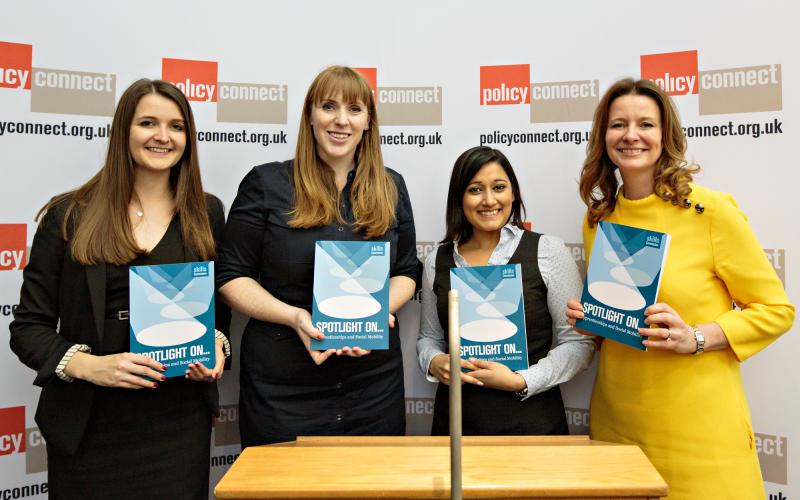Spotlight on...Apprenticeships and Social Mobility
The Skills Commission is pleased to present the third report in its Spotlight series, examining issues around access and progression in apprenticeships for young people from economically disadvantaged backgrounds.
The report follows a six month cross-party inquiry, co-chaired by Michelle Donelan MP, Conservative Member of Parliament for Chippenham; Lilian Greenwood MP, Labour Member of Parliament for Nottingham South and Peter Mayhew-Smith, CEO and Group Principal of the South Thames College Group.
“I think moving forward we will end up with a very strong and dynamic apprenticeship system that will develop over a number of years. However, I do think there is a risk that disadvantaged groups may be left behind. If we want to create an aspirational society, the system should be focused on everybody.” Michelle Donelan MP, inquiry co-chair
Michelle Donelan MP, inquiry co-chair
“Of course you want to provide opportunities for people who are already in work to progress, and that includes training to support their career development. In my mind that’s not the same as an apprenticeship that allows someone to begin a new role and receive the support needed to develop the necessary skills. I worry that things that have already been provided as internal training are being rebadged in order to spend the levy and I don’t think that’s its intention at all.”
Lilian Greenwood MP, inquiry co-chair
“We’re delighted to see such a bold and imaginative strategy for investment in technical skills for the future, but our enquiry has exposed grave concerns about the roll-out of the new Apprenticeship Levy and its ability to deliver inclusive participation and healthy levels of social mobility. We feel that the new arrangements need to be looked at again to make sure they create positive change for the people and the businesses they’re intended to benefit.”
Peter Mayhew-Smith, inquiry co-chair
As well as examining prohibitive barriers to accessing apprenticeships such as travel, living costs and social and cultural obstacles, the findings of the Skills Commission’s inquiry highlights a broader conflict around the multiple stated aims of the apprentice reforms and concerns over a potential decline in SME engagement with apprenticeships.
The report has been produced by a working group consisting of MPs, academics and further education institutions. Contributors include representatives from HS2 Ltd., KPMG, the Federation of Small Businesses, a focus group of apprentices, and sector experts including the Sutton Trust.
“This report rightly recognises that data collection and analysis is an important first step in improving retention in apprenticeship schemes, giving employers a better return on their investment. Our work to develop access to learning analytics for higher and further education has shown that data analysis can lead to improved student satisfaction, retention and attainment. By analysing the progress of apprenticeships, timely and appropriate interventions can be made to improve the experience of apprentices. Our Digital Apprenticeships project is currently looking at how we can use technology to meet the needs of employers and apprentices to improve the employability of our future workforce.”
Paul Feldman, Chief Executive, Jisc
“It is right that a principal driver behind the apprenticeship reforms has been securing greater productivity in the workforce but equally we must never lose sight that apprenticeships have a vital role in improving social mobility. In this respect, the recommendations in the Commission’s report are a timely wake-up call that more needs to be done to support young people, especially 16 to 18 year olds, into and through an apprenticeship. Ministers would be wise to act quickly on implementing them.”
Simon Ashworth, Chief Policy Officer, Association of Employment and Learning Providers (AELP)
“Creating more opportunities for young people and adults to engage in high quality training is vital if we are to successfully tackle skills challenges, increase productivity and create a more inclusive society.
As the programme expands, it is critical that everyone who could benefit from an apprenticeship has a fair chance to do so. But this is not currently the case. Unless this is addressed, we will continue to limit opportunity for individuals, and restrict the talent pool available to employers.
These recommendations - including our proposal for an Apprentice Premium - seek to tackle the financial, geographical, cultural and social barriers - that prevent many from building their career through an apprenticeship. We look forward to working with government and others to ensure even that more people have an opportunity to get in and get on.”
Dr Fiona Aldridge, Assistant Director for Research and Development, Learning & Work Institute
This report was produced by an inquiry steering group of crossparty parliamentarians and sector leaders. The inquiry was sponsored by the Association of Employment and Learning Providers, Pearson and APM UK. The Spotlight project is supported by Learning and Work Institute and the London College of Beauty Therapy (LCBT).





